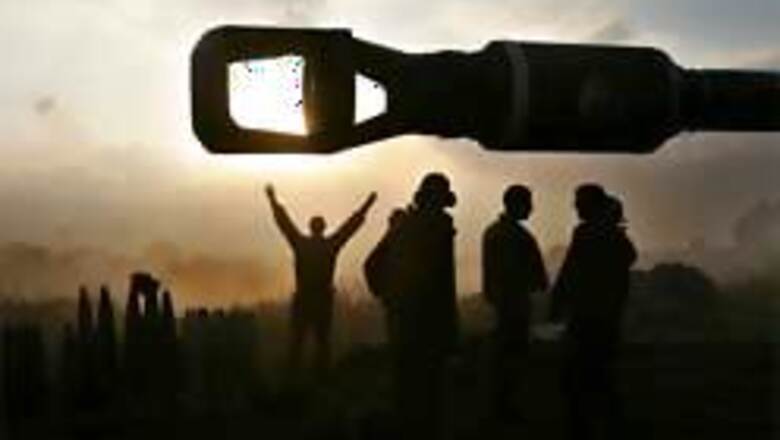
views
New Delhi: Hezbollah chief Hassan Nasrallah has vowed open war against Israel after his home in Beirut was bombed on Friday.
Several people have died in Lebanon due to the ongoing attacks after Hezbollah militants captured two Israeli soldiers on Wednesday.
Israeli officials reported that a Hezbollah explosive drone had destroyed a naval ship on Friday.
The militants continued rocket attacks against Israel.
Seventy attacks were launched by Hezbollah on Friday alone.
Four Israeli sailors were lost at sea after Hezbollah attacked an Israeli warship off the Lebanese coast in a new setback for the military in its offensive against the Shiite Muslim guerrilla group.
During the same attack, a civilian merchant ship was hit by a Hezbollah rocket, the army said. It gave no details on the nationality of the vessel or whether there were any casualties.
Israel launched its offensive after Hezbollah guerrillas crossed the Israel-Lebanon border on Wednesday and captured two Israeli soldiers. Israel has bombarded Lebanon's airport and main roads in the most intensive offensive against the country in 24 years, while Hezbollah has launched hundreds of rockets into Israel.
The intense fighting has sent shock waves through a region already traumatized by Israel's battle against Hamas militants in the Gaza Strip.
With Israeli officials pointing fingers at Hezbollah's close allies, Syria and Iran, the crisis could soon spread even further.
The damaged Israeli warship, which had been carrying several dozen sailors, was towed back to the Israeli port of Haifa early Saturday after being set on fire and suffering heavy damage.
The army confirmed reports that four sailors were missing and said a search was underway.
The army said the source of the attack was still under investigation. But military officials, speaking on condition of anonymity because the probe was at its early stages, said the ship had been struck by an unmanned drone rigged with explosives.
That would indicate that Hezbollah has added a new weapon to its standard arsenal of rockets and mortars, and could draw Iran even closer to the conflict.
Hezbollah reconnaissance drones have entered Israeli airspace twice in recent years. In those instances, Israel accused Iran of providing the drone technology to the guerrilla group.
PAGE_BREAK
''The real occupying power in Lebanon is terror - terror instigated by Hezbollah but funded by Iran and Syria,'' Israel's UN ambassador, Dan Gillerman, said at an emergency Security Council meeting Friday.
During the current campaign, Hezbollah has proved to be a tough foe. Despite numerous airstrikes on Hezbollah targets, including the headquarters of its leader, Sheik Hassan Nasrallah, Israel has been unable to stop the rocket fire.
Eight Israeli soldiers and four civilians have been killed in the fighting, and the loss of the sailors threatened to drive the death toll higher. At least 73 Lebanese have died, most of them civilians.
Some 500,000 Israelis were ordered to stay indoors and away from windows Friday night as a precaution against the rocket fire.
Residents in northern border communities were ordered to sleep in bomb shelters, which are found in virtually every Israeli home and apartment building.
Israel's army chief said Friday that Hezbollah has rockets that can reach as far as 70 kilometers (45 miles), a dire warning that more Israeli cities could be subject to attacks.
''Hezbollah used, until now, mostly rockets with a range of about 30 kilometers (20 miles),'' Halutz said. ''They have missiles with a range of 70 kilometers (45 miles), or maybe more.''
That means well-known cities and tourist attractions like Nazareth and Tiberias on the Sea of Galilee, and the central city of Hadera could be in striking range.
On Thursday Hezbollah fired two rockets at its deepest destination in Israel so far, the city of Haifa, home to Israel's largest passenger ship port, major oil refineries and several key industrial installations. Haifa is about 40 km from the Lebanese border.
As world leaders gathered for the annual G-8 summit in St. Petersburg, Russia, the Mideast fighting exposed deep rifts.
US President George W Bush seemed to accept Israel's fierce retaliation at Islamic militants. But others, notably French President Jacques Chirac, talked of a ''totally disproportionate'' and counterproductive policy.
In the middle are Britain, a close supporter of US policies that also has strong ties to the Arab world, and host Vladimir Putin, whose Russia is no stranger to tough action in what it calls its own war on terror in the Caucasus.
Bush spoke by phone with Lebanese Prime Minister Fuad Saniora and ''reiterated his position'' that the Israeli attacks should limit any impact on civilians, White House spokesman Tony Snow said.
But the promise fell short of the Lebanese leader's request for pressure for a cease-fire.
With inputs from AP













Comments
0 comment